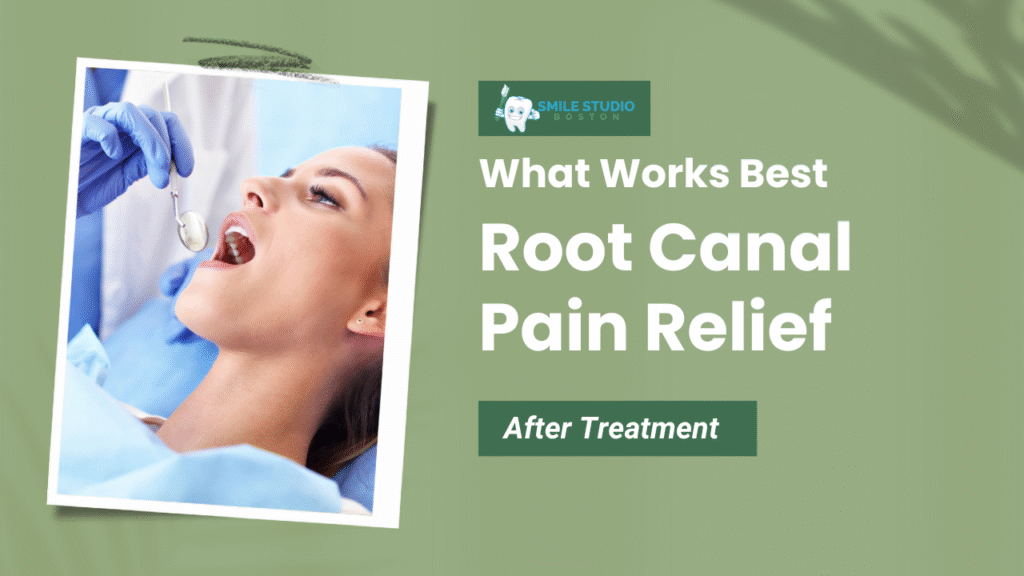Undergoing a root canal is a crucial step toward saving a tooth and eliminating infection. However, some discomfort after the procedure is common. That’s why many patients ask, what works best for root canal pain relief after treatment? Knowing how to manage post-treatment soreness effectively can make a big difference in your recovery experience.
I. Why You Feel Discomfort After a Root Canal
Mild to moderate discomfort following a root canal is completely normal. The main reason is inflammation around the treated tooth. Although the nerve has been removed, your body still responds to the procedure as it would to any minor surgical intervention.
This pain typically feels like a dull ache or tenderness and should gradually fade within a few days. At SmileStudio, we make sure our patients know what to expect and how to handle discomfort during the healing process.
II. Effective Pain Relief Methods
So, what works best for root canal pain relief after treatment? Here are proven methods our dental team recommends:
1. Over-the-Counter Medication
Non-prescription pain relievers like ibuprofen (Advil) or acetaminophen (Tylenol) help reduce both pain and inflammation. These are typically the first line of defense and are highly effective when taken as directed.
2. Home Remedies
Simple home solutions can also ease discomfort:
- Cold compress: Applying a cold pack to the cheek helps reduce swelling.
- Saltwater rinse: Gently rinsing your mouth with warm salt water helps keep the area clean and reduces irritation.
3. In-Office Pain Relief
For patients with more intense pain or lingering sensitivity, SmileStudio offers advanced options like prescription-strength medication or laser-assisted healing techniques. Our state-of-the-art technology allows us to reduce recovery time and discomfort significantly.
III. When to Call Your Dentist
While some soreness is expected, you should not feel severe pain after several days. Call SmileStudio immediately if you experience:
- Fever or chills
- Swelling that worsens
- Intense, throbbing pain that doesn’t respond to medication
- Pus or a bad taste in the mouth
These could be signs of a complication or infection, and prompt treatment is essential.
IV. Wrap Up
To sum it up, what works best for root canal pain relief after treatment depends on the severity of your symptoms and the care you receive. Over-the-counter meds, home remedies, and professional dental support all play a role in recovery.
If you’re in Boston and recently had a root canal—or are planning one—SmileStudio is here to help you feel better, faster. Schedule your personalized follow-up today and enjoy peace of mind knowing you’re in expert hands.
Start Your Journey to a Radiant Smile with SmileStudio!
At SmileStudio, we specialize in gentle dental care tailored to each patient’s needs. When it comes to what works best for root canal pain relief after treatment, our experienced team delivers:
1. Expert care in both general and restorative dentistry
2. Advanced imaging and healing tools to speed up recovery
3. Flexible appointments that suit your schedule
4. MassHealth acceptance and emergency services, so no one has to delay care
📞 Call Us: +1 (617) 265-5606
📧 Email Us: smilestudioboston@gmail.com
🌐 Visit Our Website: https://smilestudioboston.com/
📍 Find Us: 1428 Dorchester Ave, Dorchester, MA 02122, United States
SmileStudio – Where Beautiful Smiles Begin. Join us on your journey to a healthier, more radiant smile. Book your appointment now!

FAQs
Q1. What works best for root canal pain relief after treatment?
A combination of over-the-counter pain relievers like ibuprofen or acetaminophen, cold compresses, saltwater rinses, and resting the treated area works best for root canal pain relief after treatment. For persistent pain, consult your dentist.
Q2. How long should pain last after a root canal?
Mild discomfort typically lasts 1 to 3 days. If pain continues beyond a week or intensifies, it may indicate a complication, and you should call your dentist.
Q3. Is it normal to have throbbing pain after a root canal?
Yes, some throbbing or dull pain is normal as the area heals. However, sharp or severe throbbing pain could signal infection or inflammation that needs professional evaluation.
Q4. Can I take ibuprofen after a root canal?
Yes, ibuprofen is commonly recommended to reduce both pain and inflammation. Follow your dentist’s dosing instructions, or take 400–600mg every 6–8 hours, unless advised otherwise.
Q5. What should I avoid after a root canal to prevent pain?
Avoid chewing on the treated side, consuming hard or sticky foods, and skipping medications. Also, do not miss follow-up visits or your final crown placement.


